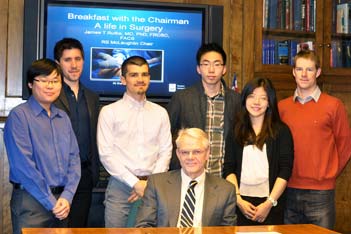Planting the Seed Early:
Breakfast with the Chair
Sessions
 Breakfast with the Chair - Year 2 students (left to right) - Eric Lai, Jesse Kancir,
Marko Skrtic, Eric (Kun) Huh, Vicki Wang, Gavin Hamilton with Jim Rutka
|
Few of us can likely recall what our understanding of
the field of surgery was as we entered medical school.
Our interests grew as we acquired more knowledge in
class, and practical experience on the wards. For this
reason, this year I started an initiative of inviting Year
1 and 2 medical students to the Banting for breakfast
while we spoke about what a career and life in surgery
looks like in 2012. I have explained to them that, for
the most part, surgeons are trained, and not born; that
the technical skills of a surgeon are acquired over years
of practice and repetition; that a surgeon is a leader of a
team in the operating room; and that surgical residency
training is well regulated these days with a balance of
challenging, and not so challenging rotations. For some,
the length of training to be a surgeon is an issue, as they
may have been to graduate school already, and may have
acquired a significant debt load. But it has been a great
opportunity for me to express how gratifying the life of
a surgeon can be.
|
As with many of you, I enjoy the opportunity to intervene
in a patient’s life at a time that is critical; I have
always enjoyed the practical use of anatomy learned in
medical school; I have especially enjoyed the technical side of surgery; I am comfortable with the decision
making and the speed with which patient care is administered
at times in surgery; and I actually prefer to look
after the disease processes that face a surgeon.
Towards the end of each session, we talk about the
particular challenges that a life in surgery brings, and
the importance of maintaining one’s balance point
throughout residency, and throughout life. In the end, I
am hopeful that we are opening the eyes of some of our
medical students to a world of surgery that may encourage
them to apply for residency after clerkship. At the
very least, it has reminded me of my early days in medical
school, and how much I enjoyed learning the art and
practice of medicine and surgery.
James Rutka
|